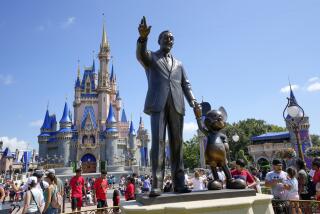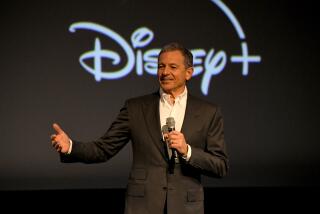Disney’s Eisner Got Bonus of $5 Million
- Share via
Despite enduring the harshest criticism of his leadership ever, Walt Disney Co. Chief Executive Michael Eisner got something in 2002 that he didn’t get a year earlier: a bonus.
Disney’s proxy statement released Tuesday showed Eisner received a $5-million stock bonus for Disney’s fiscal year ended Sept. 30 -- on top of his $1-million annual salary -- even though Disney’s stock has languished and the company’s profit was hurt by the sluggish theme park business and problems at its ABC network.
“It wasn’t a great year for him,” said executive compensation expert Graef Crystal, who helped Disney craft Eisner’s original pay package. “My own taste would have been to give him zero.”
Disney President and Chief Operating Officer Robert Iger also received a lucrative compensation package that the company says reflects his increasing responsibilities.
In the last fiscal year, Iger received a $1-million salary plus a $3-million cash bonus and $1 million in stock.
In addition, as part of a contract extension, he received stock options that, although worth nothing now, have a projected value of $12.6 million. The proxy notes that in December, Iger’s annual salary was increased to $2 million.
According to the proxy, Disney’s compensation committee believed that Eisner should be rewarded for leading “in a difficult economic environment that challenged all of the company’s major businesses” and laying the groundwork for a future comeback.
That, the document says, includes developing a new theme park strategy, tightening cost controls in such areas as the company’s film unit and expanding Disney’s international business.
It was Eisner’s decision to take the bonus in stock, according to the document. Eisner received 298,775 shares at Disney’s closing price of $16.74 a share Monday. Half the shares vest in two years, with the rest vesting at the end of Eisner’s contract, which runs through 2006. He did not get new stock options during the year.
A spokeswoman for the Burbank-based firm said the proxy statement spoke for itself, and she would not elaborate.
Crystal said that although Disney’s stock beat the Standard and Poor’s 500 index in the fiscal year for one of the few times in the last decade (a decline of 17.9% compared with a drop of 20.5%) “that’s hardly the occasion for dancing in the streets of Burbank.”
Some investors said the compensation was justified.
“These are relatively modest amounts for guys running a Dow 30 company,” said David Davis, an investment banker with Houlihan Lokey Howard & Zukin in Los Angeles, who recently purchased 3,000 Disney shares for himself.
By Eisner’s standards, the amount of the new bonus is relatively paltry.
Frequently among the most highly paid executives since he was brought in to turn around the company in 1984, Eisner five years ago reaped $576 million, largely from stock options he exercised. Two years ago, Eisner earned $12.3 million.
Disney’s last fiscal year was one of the bleakest the company has endured in a decade, mainly because of the steep falloff in tourism and weak ratings at its ABC television network. The company’s stock price has lagged, and its credit rating was downgraded. Operating income fell 33% to $2.8 billion.
Eisner also came under criticism from shareholders and even members of his board of directors, notably Vice Chairman Roy Disney and his chief lieutenant, Stanley Gold. Sources said Gold and Disney voiced their displeasure with the bonus. Both men declined to comment Tuesday.
In his annual letter to shareholders, Eisner acknowledged the weak performance last year. But he repeated Disney’s forecast for 25% to 35% earnings growth in 2003, driven by expected improvements at ABC, Disney’s theme parks and its ESPN cable franchise.
More to Read
The biggest entertainment stories
Get our big stories about Hollywood, film, television, music, arts, culture and more right in your inbox as soon as they publish.
You may occasionally receive promotional content from the Los Angeles Times.











